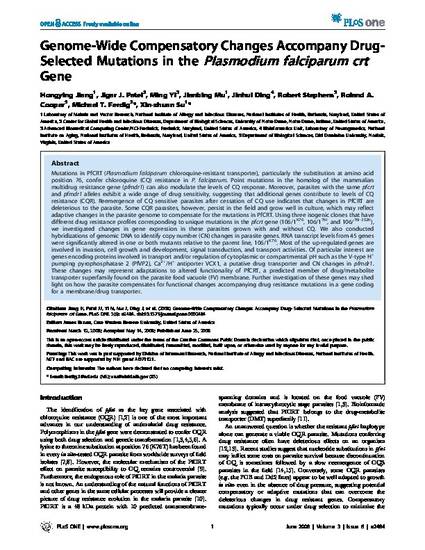
Mutations in PfCRT (Plasmodium falciparum chloroquine-resistant transporter), particularly the substitution at amino acid position 76, confer chloroquine (CQ) resistance in P. falciparum. Point mutations in the homolog of the mammalian multidrug resistance gene (pfmdr1) can also modulate the levels of CQ response. Moreover, parasites with the same pfcrt and pfmdr1 alleles exhibit a wide range of drug sensitivity, suggesting that additional genes contribute to levels of CQ resistance (CQR). Reemergence of CQ sensitive parasites after cessation of CQ use indicates that changes in PfCRT are deleterious to the parasite. Some CQR parasites, however, persist in the field and grow well in culture, which may reflect adaptive changes in the parasite genome to compensate for the mutations in PfCRT. Using three isogenic clones that have different drug resistance profiles corresponding to unique mutations in the pfcrt gene (106/1(K76), 106/1(76I), and 106/(76I-352K)), we investigated changes in gene expression in these parasites grown with and without CQ. We also conducted hybridizations of genomic DNA to identify copy number (CN) changes in parasite genes. RNA transcript levels from 45 genes were significantly altered in one or both mutants relative to the parent line, 106/1(K76). Most of the up-regulated genes are involved in invasion, cell growth and development, signal transduction, and transport activities. Of particular interest are genes encoding proteins involved in transport and/or regulation of cytoplasmic or compartmental pH such as the V-type H(+) pumping pyrophosphatase 2 (PfVP2), Ca(2+)/H(+) antiporter VCX1, a putative drug transporter and CN changes in pfmdr1. These changes may represent adaptations to altered functionality of PfCRT, a predicted member of drug/metabolite transporter superfamily found on the parasite food vacuole (FV) membrane. Further investigation of these genes may shed light on how the parasite compensates for functional changes accompanying drug resistance mutations in a gene coding for a membrane/drug transporter.
Copyright © 2008 The Author(s)
Available at: http://works.bepress.com/roland_cooper/25/
